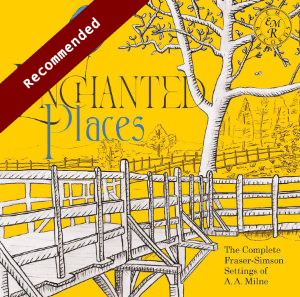
Harold Fraser-Simson (1872-1944)
Enchanted Places – Complete Settings of Songs by A.A. Milne
Christopher Robin Songs
The Complete Hums of Pooh
Stories
More Christopher Robin Songs
Yet More Christopher Robin Songs
The King’s Breakfast
Grant Doyle (baritone)
John Kember (piano)
rec. 2019/20, Porcupine Studios, London
No texts provided
EM Records EMRCD082-3 [2 CDs: 149]
It may be safe to say that few people in the English-speaking world have not been exposed to Christopher Robin and Winnie-the-Pooh. It might have been via A. A. Milne’s books or E. H. Shepard’s drawings, or perhaps one of the cartoons, movies, recordings and so on that Milne’s works have inspired.
One of the first reworkings of the stories and poems is the 67 songs of Harold Fraser-Simson. He was a successful operetta composer, whose biggest hit was The Maid of the Mill from 1916 (review ~ review). He wrote successful operettas after World War I, but broadened his range to include ballets and incidental music. After the publication in 1924 of the first Pooh book When We Were Very Young, several composers almost immediately approached Milne about setting the poems. Milne settled on Fraser-Simson, who was a near neighbor, and he produced six books of Milne songs in 1924-1932.
The settings cover a wide range of styles. That can be a challenge to sing, especially when one singer performs the whole set, as Grant Doyle does here. There are patter songs, such as The More It Snows or waltzes like Cottleston Pie. Pooh’s personal declaration Sing Ho for the Life of a Bear is almost Stanfordian, and it might fit into Songs of the Fleetif its subject were a battleship instead of a bear. The wistfulness of Wind on the Hill reminded me of Elgar’s Chanson de nuit and Chanson de matin. A little of Pomp and Circumstance shows up in the well-known Buckingham Palace. There is more depth in Jonathan Jo and Waiting at the Window.
The five songs collected here as Stories, longer than most, enabled Fraser-Simson to explore a greater narrative style. The gem of the set is Spring Morning, the most wistful song in the programme, and one of the best. Teddy Bear is even longer. The simple title conceals a six-minute scena, in the composer’s best satirical style, about the King of France – even if France had not had a monarch for about 80 years when he wrote the song.
Last on these discs, if not in Milne’s chronological order, is The King’s Breakfast. The song of about six minutes is combined here with a two-part spoken introduction and with another song, Feed my Cow. The narrator is Brian Sibley, who has been involved in many Pooh publications and productions. His renditions are flawless; one would wish to hear him recorded reading Milne’s poems.
Feed my Cow – which plays a part in the story – gets its first recording, as do almost a dozen other songs. This may be the most typically pastoral song of them all. The number actually named The King’s Breakfast is another delightful scena. There is a postlude played not by John Kember at the piano, but by Grant Doyle himself, with hornist Tom Pollock, violinist Eloise Prouse and cellist Dan Burrows.
The songs have two essential qualities. They fit Milne’s poetry perfectly, and are completely unpretentious. One must understand these qualities to put the songs forward naturally, and these artists reach the high bar without effort. Grant Doyle does not condescend or make any of the songs childlike. He brings out the cleverness of the texts and the skill with which Fraser-Simson set them. His characterizations are apt, and he finds the right vocal quality for each song, especially those in the lower register. Accompaniment is sometimes quite subtle and sometimes complex. John Kember, a worthy partner, plays an equal part in establishing the Milne atmosphere. A complete delight.
William Kreindler
Help us financially by purchasing from




















